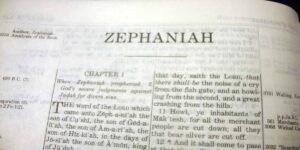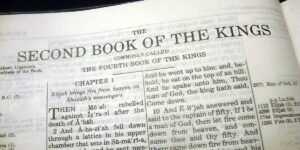“Joel, the son of Pethuel,” whose name means “Yahweh is God,” gives the book its title. Little is known of Joel except what is learned in the book itself. His references to Judah and Jerusalem, along with his knowledge of the activities of priests and the temple, suggest that he was from Judah or perhaps even Jerusalem. His address to priests and elders likely eliminates him as a member of either group.
The “day of the Lord” is the dominant theme of the book of Joel. Both the nations and Israel experience this judgment. However, for the repentant community, the “day” also holds out the hope of restoration. Ultimately, the Lord’s covenant faithfulness is expressed in his promises of abundance and protection, which evidence his dwelling in the midst of his people. This is epitomized in the great promise of “my Spirit” that would be poured out on “all flesh”.
Joel calls all the inhabitants of Judah and Jerusalem to lament and return to the Lord during a time of national calamity. This crisis is precipitated in the first instance by a locust plague that has destroyed both wine and grain and therefore threatens the ability of the people of God to present offerings in the temple. Given this background, Joel may have served as a lament in the ongoing life of God’s people during other times of national tragedy.
The locust plague was only a foretaste of the judgment to come in the day of the Lord. This is a timeless call to repentance with the promise of blessing. Just as the people faced the tragedy of their crops being destroyed, we too will face tragic judgment if we live in sin. But God’s grace is available to us both now and in that coming day.
Authorship and Date
The author of this book was the prophet Joel, who identifies himself in the introduction as “the son of Pethuel.” His many references to agriculture may indicate he was a farmer or a herdsman.
Unlike most of the other Old Testament prophets, Joel mentions no kings of Judah or Israel and no historical events that might give us some indication about when he wrote his prophecy. The similarity of Joel’s concept of the day of the Lord to the language of the prophet Zephaniah may indicate they were contemporaries. Zephaniah prophesied shortly before the fall of Jerusalem and the nation of Judah in 587 B.C.
Historical Setting of Joel
If Joel did write the book about 600 B.C., he would have lived in the frantic final years of the nation of Judah. After the Babylonian army destroyed Jerusalem in 587/596 B.C. the leading citizens of Judah were carried into captivity in Babylon.
Theological Contribution
The book of Joel is remarkable because it shows that a message from God can often come packaged in the form of a natural disaster. This prophet teaches us that the Lord may use a natural disaster to stir His people a renewed awareness of His will.
Special Consideration of Joel
Readers of Joel are always impressed with the prediction of the future outpouring of the Holy Spirit. The apostle Peter used this passage to explain the exciting events of Pentecost to his hearers. Just as Joel predicted, the Holy Spirit was poured out on all these early followers of Jesus who were gathered in Jerusalem seeking God’s will and praying for His divine guidance.
Click here to download or print the Bible outline “Joel – Jehovah is God“.





